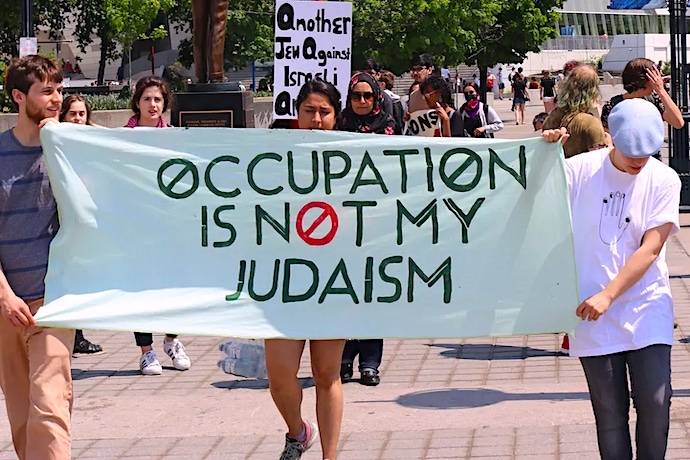Progressive synagogue Tzedek Chicago, founded in 2015 and led by Rabbi Brant Rosen, recently made an announcement that elicited strong reactions in much of the Jewish press and beyond. Opting to change their identity from “non-Zionist” to “anti-Zionist,” they released the following statement:
While we appreciate the important role of the land of Israel in Jewish tradition, liturgy and identity, we do not celebrate the fusing of Judaism with political nationalism…We are anti-Zionist, openly acknowledging that the creation of an ethnic Jewish nation-state in historic Palestine resulted in an injustice against the Palestinian people – an injustice that continues to this day.
The fusion of Judaism and nationalism is an important and complex point as that was the initial protest against Zionism in many liberal Jewish circles in America. Zionism “nationalizes” the Jew, and Judaism, in ways that ostensibly subverted the normalization of the Jew as citizen in the post-emancipated Diaspora. This is how it was articulated in the 1885 Pittsburgh Platform of Reform Judaism in America which stated that “we [Jews] no longer consider ourselves a nation, but a religious community.”
While Reform Judaism no longer holds to this maxim, it did serve as the cornerstone of the denomination for much of its existence. The decision of Tzedek Chicago (which is not Reform) to drop the more neutral non-Zionist stance in favor of an anti-Zionist one reflects that sentiment. Apparently, judging by the response in much of the Jewish world, the prefix anti simply cannot be applied to Zionism, even as it can be applied to many other issues. The question is: why?
Asked to clarify the synagogue’s decision, Rosen, a former Reconstructionist rabbi, said, “a non-Zionist is someone for whom Israel and Zionism is a topic they are neutral on … it’s not an identity, it’s a descriptive statement.”
By contrast, he said, an anti-Zionist takes a more proactive stance and clearly “opposes the very concept of an exclusively Jewish nation-state in historic Palestine.”
It’s important to note that opposing an exclusively Jewish state in historic Palestine was not always an “anti-Zionist” position. In fact, it was not uncommon among many Zionists including Martin Buber, Judah Magnes, Ernst Akiva Simon, Hannah Arendt and many others. And as Hebrew University professor Dmitry Shumsky shows in his book Beyond the Nation State, many of the more mainstream Zionists didn’t envision a “Jewish” state but something closer to the binational state that non- and anti-Zionists are now promoting. But today if one believes in a truly binational state or, put otherwise, a liberal democracy, from the river to the sea, one is no longer viewed as a Zionist, even if one claims to be.
These issues can be debated from many directions, but I’d like to focus on why non-Zionism is quietly tolerated while anti-Zionism evokes the ire of many Zionists, making the anti the enemy, not only of Israel, but of the Jews. (I speak here only of Jewish anti-Zionists as they are the ones who are viewed as the “enemy within.”) So why have anti-Zionists become the enemy of the Jews?
Anxiety of the prefix
I suggest we’re living in a time of the “anxiety of the prefix.” In a 2005 essay entitled, “Hyphenated-Jews and the Anxiety of Identity,” philosopher Berel Lang explored the notion of the hyphen that both divides and connects the Jew (and other ethnic minorities) from their Americanness. Should American Jews be hyphenated citizens? Jewish-American or American Jew; hyphen or no hyphen. Jews as an ethnos, like Irish-Americans, or Jews as carrier of a religion, like American Catholics? The American Jew lives in the anxiety of the hyphen, and flourishes there. The hyphen allows for considerable leeway in terms of legitimate negotiation between one’s Jewish and American identity.
Today it seems that the complex negotiation of that identity for American Jews has moved from the hyphen to the prefix, given the role of Zionism in their identity. For many no prefix is required; one does not need to say they are “pro-Zionist,” Zionist is sufficient. And many who self-identify as Zionists do so even as the meaning of that term is far from clear. In fact, many self-affirming Zionists aren’t even aware that there are various kinds of Zionism. Secular, religious, socialist, muscular, humanistic, liberal, neoliberal, reactionary.
But today, at least in America, for better or worse, much of that has settled into a simple maxim of supporting the state of Israel—sometimes critically, but never overly so. Of course, what even is legitimate critique? It is the Zionist who decides. The Zionist both defines the term and polices its boundaries.
Since Zionism has become ubiquitous in American Jewry, what do those who choose not to identify as Zionists call themselves? Zionism has become so deeply embedded in American Jewry one cannot simply ignore it; one must either accept it or reject it. And if one rejects it, one must modify that rejection. Just saying you’re not a Zionist is not quite sufficient today. You must say more. You need a prefix to define your negation.
Just as the hyphen negotiates the relationship between Jewishness and Americanness, the prefix negotiates one’s relationship to Zionism. Now, of course, by debating the very meaning of Zionism itself we can also debate what the non or anti prefix actually means. My interest, however, is a bit different; to explore the function of non or anti in relation to what Zionism means, and why those prefixes cause so much anxiety for those who don’t require a prefix at all—that is, for those who simply identify as “Zionists.”
Why is this anti so different?
Let’s briefly look at the term anti in relation to other Jewish norms. Jewish Orthodoxy, for example, is a position that pledges fidelity to traditional theological precepts and a belief in the authority of the law (halakha) as traditionally defined and codified. There are many forms of Orthodoxy but one thing most share is the belief that non-Orthodox Judaism is errant. So Orthodox Judaism isn’t just non-non-Orthodox, it’s anti-non-Orthodox—it maintains that non-Orthodoxy is simply a distortion of the tradition.
This is not only the view of ultra-Orthodox Jews but many Modern Orthodox Jews as well: for example, the late Rabbi Jonathan Sacks who was very clear in his highly negative views of non-Orthodox Judaism that can only be described as an anti position. I’ve had Orthodox teachers who refused to step into a Reform synagogue the same way they refused to step into a church. I don’t say this judgmentally. The category of anti is a perfectly legitimate one, rooted in the biblical notion of monotheism as anti idolatry.
Why then is “anti-Zionism” so different; as if to say, I can be an Orthodox Jew who refuses to step into a Reform synagogue, or an anti-Orthodox Conservative Jew who, for reasons of egalitarianism, refuse to be counted in an Orthodox minyan that doesn’t include women (I know many of those too), but being an anti-Zionist is somehow anathema? Religion tolerates an anti category, as it should, but Zionism somehow cannot.
This is not as new as we may think. In 1977, historian of Zionism Arthur Hertzberg wrote the following:
“the only offense for which Jews can be ‘excommunicated’ in the US today is not to participate in these efforts [to support Israel]. Intermarriage, ignorance of the Jewish heritage, or lack of faith do not keep anyone from leadership in the American Jewish community today. Being against Israel or apathetic in its support does.”
Allowing Zionism to define its own terms
One hears a variety of arguments about why opposing Zionism is illegitimate by definition. First, that the majority of American Jews are Zionists. This is true. But a large majority of American Jews are not Orthodox and Orthodox Jews (who make up about 10% of American Jews) have no trouble being anti-non-Orthodox—i.e. to maintain that non-Orthodox Judaism is a distortion. One could argue that half the world’s Jews live in Israel. This is true. But the other half live in the diaspora and one regularly hears Israelis say that there’s no future for Jews in the diaspora (in Zionist nomenclature, “negation of the diaspora”) and they’re not viewed as the enemy of the Jews.
What one is anti about when one defines oneself as anti-Zionist is a good question. In some cases, if it stands in opposition to the very existence of the state of Israel or the denial of the land of Israel as a Jewish homeland—that is, if it singles out Israel as invalid by definition—this moves close to a form of antisemitism. Thus, some forms of anti-Zionism certainly cross over into antisemitism. But let us read Rosen carefully.
Tzedek Chicago “opposes the very concept of an exclusively Jewish nation-state in historic Palestine.” Not against a “Jewish nation-state” but “an exclusively Jewish nation-state.” This isn’t a claim against the land of Israel as the homeland of the Jewish people. In that regard “Jewish” could be attached to the nation-state that exists there. Just not exclusively, because it’s also the homeland of another people who now make up close to a quarter of the population of the state’s borders and about half the population of the land of Israel. Tzedek Chicago is thus allowing Zionism to define its own terms, “an exclusively Jewish-state,” and defines itself as anti that definition.
Why give Zionism the power to define itself in such a manner? Perhaps because the 2018 Nation State Law states that Israel is only (read: exclusively) the state of the Jewish people and those non-Jews who hold Israeli citizenship, have no collective rights, only individual rights. Non-Jews can be citizens of the state of Israel but it is not really their country, it is the country exclusively of the Jewish people.
Think, for example of what it is for a Palestinian Israeli to sing the Israeli National Anthem. The anthem not only excludes them, it erases them. It erases close to one quarter of the state’s population. This all sounds eerily like the French emancipation of the Jews, “to the Jew everything, to the Jewish people nothing.” Not something Jews today would find very appealing in the democracies where they live.
Zionism is a multi-faceted thing. I can’t imagine anyone being opposed to the renaissance of Hebrew culture or the flourishing of the Hebrew language, the arts, and the development of Jewish humanistic values, the religious value of living in the land of Israel. Even ultra-Orthodox anti-Zionists agree with the latter. The anti of anti-Zionism is thus very specific: it is opposed to the chauvinistic Zionist foundations of the socio-political reality called Israel.
And here anti-Zionists are not necessarily anti-Israel. Israel is a nation-state. Zionism is an ideology. Many anti-Zionists would support the state of Israel if it were not based on what Chaim Ganz calls “proprietary Zionism”; that is, that the land of Israel, all of it, belongs to the Jews as a foundation of its political program and the starting point of any kind of negotiation.
Why so defensive?
Some anti-Zionists believe that Zionism was necessary as an ideology to establish a new state where Jews could find refuge and exercise self-determination. But ideologies change with time. John O’Sullivan developed Manifest Destiny in America in the mid nineteenth century to justify westward expansion and the decimation of Native Americans. But the only Americans who believe that today are white supremacists. To say that Zionism was necessary doesn’t mean it also has to still be relevant.
When ideologies become dogmatic they can often run counter to the flourishing of political realities. I think that’s part of what some anti-Zionists like Tzedek Chicago are claiming. Cultivating a new political ideology that promotes the flourishing of all of a state’s citizens is a true aspiration. Some anti-Zionists don’t think Zionism is capable of that. It certainly hasn’t been up to now.
Perhaps the problem with being anti-Zionist isn’t with the anti, but the Zionist. The Zionist who can’t tolerate anti-Zionism is no better than the anti-Zionist who can’t tolerate Zionism. It seems to me something is deeply wrong with a Zionism that cannot understand, much less tolerate—even as it disagrees with—a foundational critique of itself. What is it that makes Zionism so defensive?
Perhaps we need to begin re-thinking a new, more inclusive national ideology outside of Zionism that can better promote the flourishing of all who live between the river and the sea. Because right now it seems clear that Zionism has failed in doing so. That would include a new national anthem and a new political framework for true equality for all its citizens. Israel is a highly developed country bursting with possibility. And a country stuck with an ideology that impedes equality, justice, and fairness. Maybe the true messianic move is not to defend Zionism, but to let it go. Maybe the anti-Zionists are on to something, if we only allow ourselves to listen.





